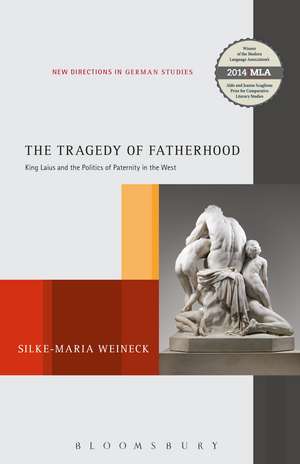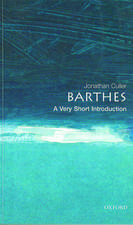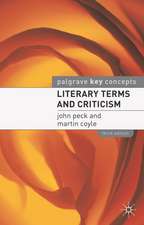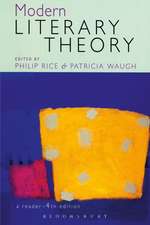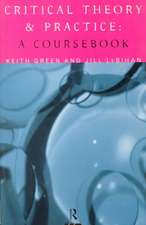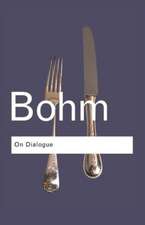The Tragedy of Fatherhood: King Laius and the Politics of Paternity in the West: New Directions in German Studies
Autor Silke-Maria Weinecken Limba Engleză Paperback – 22 oct 2014
| Toate formatele și edițiile | Preț | Express |
|---|---|---|
| Paperback (1) | 190.50 lei 3-5 săpt. | |
| Bloomsbury Publishing – 22 oct 2014 | 190.50 lei 3-5 săpt. | |
| Hardback (1) | 830.20 lei 6-8 săpt. | |
| Bloomsbury Publishing – 22 oct 2014 | 830.20 lei 6-8 săpt. |
Din seria New Directions in German Studies
- 14%
 Preț: 183.70 lei
Preț: 183.70 lei -
 Preț: 470.90 lei
Preț: 470.90 lei - 8%
 Preț: 145.46 lei
Preț: 145.46 lei - 11%
 Preț: 219.84 lei
Preț: 219.84 lei -
 Preț: 169.03 lei
Preț: 169.03 lei -
 Preț: 217.09 lei
Preț: 217.09 lei - 7%
 Preț: 134.49 lei
Preț: 134.49 lei - 14%
 Preț: 183.24 lei
Preț: 183.24 lei -
 Preț: 217.62 lei
Preț: 217.62 lei - 21%
 Preț: 214.78 lei
Preț: 214.78 lei - 30%
 Preț: 718.85 lei
Preț: 718.85 lei - 22%
 Preț: 237.93 lei
Preț: 237.93 lei - 22%
 Preț: 225.77 lei
Preț: 225.77 lei - 22%
 Preț: 256.77 lei
Preț: 256.77 lei - 22%
 Preț: 225.41 lei
Preț: 225.41 lei - 23%
 Preț: 222.46 lei
Preț: 222.46 lei - 30%
 Preț: 714.12 lei
Preț: 714.12 lei - 30%
 Preț: 568.22 lei
Preț: 568.22 lei - 21%
 Preț: 218.36 lei
Preț: 218.36 lei - 11%
 Preț: 218.47 lei
Preț: 218.47 lei - 13%
 Preț: 186.35 lei
Preț: 186.35 lei - 30%
 Preț: 569.94 lei
Preț: 569.94 lei - 21%
 Preț: 218.83 lei
Preț: 218.83 lei - 22%
 Preț: 256.20 lei
Preț: 256.20 lei - 14%
 Preț: 190.06 lei
Preț: 190.06 lei - 23%
 Preț: 197.14 lei
Preț: 197.14 lei - 13%
 Preț: 255.11 lei
Preț: 255.11 lei - 22%
 Preț: 226.79 lei
Preț: 226.79 lei - 30%
 Preț: 568.14 lei
Preț: 568.14 lei - 14%
 Preț: 191.85 lei
Preț: 191.85 lei -
 Preț: 183.24 lei
Preț: 183.24 lei -
 Preț: 231.81 lei
Preț: 231.81 lei - 22%
 Preț: 230.24 lei
Preț: 230.24 lei
Preț: 190.50 lei
Preț vechi: 248.91 lei
-23% Nou
Puncte Express: 286
Preț estimativ în valută:
36.45€ • 37.81$ • 30.40£
36.45€ • 37.81$ • 30.40£
Carte disponibilă
Livrare economică 06-20 martie
Preluare comenzi: 021 569.72.76
Specificații
ISBN-13: 9781628927894
ISBN-10: 1628927895
Pagini: 224
Dimensiuni: 140 x 216 x 20 mm
Greutate: 0.3 kg
Ediția:New.
Editura: Bloomsbury Publishing
Colecția Bloomsbury Academic
Seria New Directions in German Studies
Locul publicării:New York, United States
ISBN-10: 1628927895
Pagini: 224
Dimensiuni: 140 x 216 x 20 mm
Greutate: 0.3 kg
Ediția:New.
Editura: Bloomsbury Publishing
Colecția Bloomsbury Academic
Seria New Directions in German Studies
Locul publicării:New York, United States
Caracteristici
Revelatory readings of canonical texts in literature, philosophy and political thought
Notă biografică
Silke-Maria Weineck is Chair of Comparative Literature and Professor of German Studies and Comparative Literature at the University of Michigan, USA. She is the author of The Abyss Above: Philosophy and Poetic Madness in Plato, Hölderlin, and Nietzsche (2002).
Cuprins
Section I: Freud's Fatherhood IOne RevenantsSection II: The Tragic FatherTwo The Laius ComplexThree Oedipus PatêrFour "I Must Do What I've Been Told": Abraham and the Conditions of PaternitySection III: The Political FatherFive Aristotle and the Body of the FatherSix Paternity and the Perfect CitySeven Hobbes: The End of the Paternal TriadSection IV: The Rise of the SonEight "I Will Be King No More": Lessing's Philotas and the Abdication of the Father Nine Kleist: Paternal Resurrections Section V: Freud's Fatherhood IITen The Gschnas, or the Path to the Fatherless SocietyConclusion Dead ChildrenBibliography
Recenzii
The Tragedy of Fatherhood is a tour de force that will open new avenues of research. Although the pater familias is generally considered the model for all figures of authority, his position has gone largely unaddressed in criticism except from the vantage point of the son or the subservient subject. Silke Weineck's elegant and thought-provoking study lifts the father from the shadows and lets him speak as a figure that is at once powerful but vulnerable, the bedrock of the social order but also its most contested member. The book combines an enormous wealth of learning with grace and wit, and is written in a manner that should be the envy of all scholars in the humanities.
In this highly reflective and provocative study, Weineck offers a series of consummate literary analyses, which interrogate conventional truisms of psychoanalytic discourse and political theory. With a brilliant shift in perspective, The Tragedy of Fatherhood demonstrates to what extent the figure of the father has been reduced to mere instances of the filial imagination. The result is a richly nuanced and theoretically sophisticated assessment of conceptualizations of paternity throughout the literary and political traditions of the West, which calls for an entire reconsideration of how notions of sovereignty, authority, and legitimacy have been and continue to be formulated.
The subject of Silke-Maria Weineck's The Tragedy of Fatherhood is central and compelling-the vicissitudes of the 'paternal triad,' the authority vested in family fathers, kings, and gods as concretely imagined in myth, literature, and psychoanalytic theory. Weineck's erudition, especially where Greek and German writers are concerned, her gracious sensibility, theoretical finesse, and writerly flair hold this threatening matter at bay: her critical imagination is a continual source of revisionary insight and complex pleasure.
This important study is of immense value to any reader interested in the history of family formation, the relationship between antiquity and modernity, the precursors of psychoanalysis in Greek tragedy, and representations of fatherhood in Western culture.
This fresh and original study turns our notions of paternal power and its dominance upside down to argue through texts from literature, psychoanalysis, philosophy, and political theory that history has been written mainly by the son, who is both heir and victim. Freud, Greek tragedy (Laius, Oedipus) and philosophy (Aristotle) are joined to the Hebrew Bible (Abraham), among others, in order to offer another set of readings, especially of German authors (Hofmannsthal, Lessing, Kleist) that will challenge the reader to think our familiar tropes anew.
The Tragedy of Fatherhood is a remarkable book. Its conversational style makes for pleasant reading, and the wealth of material makes the reading profitable. The summary offered here can only suggest its argumentative breadth and depth of learning: Weineck has selected texts and time periods conscientiously in order to provide, not a history of fatherhood, but a reflection on the critical moments that have shaped Western notions of fatherhood vis-à-vis politics, religion, and the family.
[A]n engagingly written book that offers a broad angle on a topic that never seems outdated ... Weineck takes us on an interesting and ... novel journey through the centuries, delivering her thoughts in an immaculate, captivating style.
Silke-Maria Weineck's broad yet precise study of the representation of fatherhood in psychoanalysis, political philosophy, and literature has the virtue of making us rethink what we tend to take for granted: the status and definition of the father in Western culture. . The quality of her insights is enhanced by her graceful prose style, which lends clarity to ideas of great complexity. While her approach is exemplary of thoughtful scholarship, it is clear that she cares deeply about the issues that she raises.
Ambitious and compelling . [Weineck's] book offers a powerful revisionist history of fatherhood as a site of crisis and, perhaps more significantly, gives us a new set of tools to think about the relationship between fatherhood and power, or, more accurately, about fatherhood and the forms of disempowerment.
Weineck's elegantly written work is not only insightful but also generative. It solicits further pursuit of the relations she draws ... The lines of inquiry that Weineck opens and provokes testify to the strength of her achievement as vividly as the persuasive arguments and readings she sets forth.
Illuminating . If it is beyond the confines of this review to detail the development of Weineck's argument and reading of these texts, it is surely not beyond the confines of the reader's engagement with her book to enjoy and learn from it.
In this highly reflective and provocative study, Weineck offers a series of consummate literary analyses, which interrogate conventional truisms of psychoanalytic discourse and political theory. With a brilliant shift in perspective, The Tragedy of Fatherhood demonstrates to what extent the figure of the father has been reduced to mere instances of the filial imagination. The result is a richly nuanced and theoretically sophisticated assessment of conceptualizations of paternity throughout the literary and political traditions of the West, which calls for an entire reconsideration of how notions of sovereignty, authority, and legitimacy have been and continue to be formulated.
The subject of Silke-Maria Weineck's The Tragedy of Fatherhood is central and compelling-the vicissitudes of the 'paternal triad,' the authority vested in family fathers, kings, and gods as concretely imagined in myth, literature, and psychoanalytic theory. Weineck's erudition, especially where Greek and German writers are concerned, her gracious sensibility, theoretical finesse, and writerly flair hold this threatening matter at bay: her critical imagination is a continual source of revisionary insight and complex pleasure.
This important study is of immense value to any reader interested in the history of family formation, the relationship between antiquity and modernity, the precursors of psychoanalysis in Greek tragedy, and representations of fatherhood in Western culture.
This fresh and original study turns our notions of paternal power and its dominance upside down to argue through texts from literature, psychoanalysis, philosophy, and political theory that history has been written mainly by the son, who is both heir and victim. Freud, Greek tragedy (Laius, Oedipus) and philosophy (Aristotle) are joined to the Hebrew Bible (Abraham), among others, in order to offer another set of readings, especially of German authors (Hofmannsthal, Lessing, Kleist) that will challenge the reader to think our familiar tropes anew.
The Tragedy of Fatherhood is a remarkable book. Its conversational style makes for pleasant reading, and the wealth of material makes the reading profitable. The summary offered here can only suggest its argumentative breadth and depth of learning: Weineck has selected texts and time periods conscientiously in order to provide, not a history of fatherhood, but a reflection on the critical moments that have shaped Western notions of fatherhood vis-à-vis politics, religion, and the family.
[A]n engagingly written book that offers a broad angle on a topic that never seems outdated ... Weineck takes us on an interesting and ... novel journey through the centuries, delivering her thoughts in an immaculate, captivating style.
Silke-Maria Weineck's broad yet precise study of the representation of fatherhood in psychoanalysis, political philosophy, and literature has the virtue of making us rethink what we tend to take for granted: the status and definition of the father in Western culture. . The quality of her insights is enhanced by her graceful prose style, which lends clarity to ideas of great complexity. While her approach is exemplary of thoughtful scholarship, it is clear that she cares deeply about the issues that she raises.
Ambitious and compelling . [Weineck's] book offers a powerful revisionist history of fatherhood as a site of crisis and, perhaps more significantly, gives us a new set of tools to think about the relationship between fatherhood and power, or, more accurately, about fatherhood and the forms of disempowerment.
Weineck's elegantly written work is not only insightful but also generative. It solicits further pursuit of the relations she draws ... The lines of inquiry that Weineck opens and provokes testify to the strength of her achievement as vividly as the persuasive arguments and readings she sets forth.
Illuminating . If it is beyond the confines of this review to detail the development of Weineck's argument and reading of these texts, it is surely not beyond the confines of the reader's engagement with her book to enjoy and learn from it.
